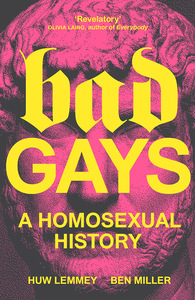You need to sign in or sign up before continuing.
Take a photo of a barcode or cover
inspiring
reflective
medium-paced
dark
emotional
funny
informative
reflective
medium-paced
Perhaps, inevitably, this book was never going to be enough for some reviewers. I’ve seen some interestingly conflicting reactions, meaning the reviews have been fascinating to read too. It’s not entertaining enough or it has too many jokes. It’s too dense and boring or it’s too shallow. Some people seized on the subtitle (which was admittedly probably a bad idea) of this being a queer history versus the “Bad Gays” main title. And so on.
I picked this up on vacation not knowing it was based on a podcast, as I was just intrigued by the title and premise. My knowledge of queer history is decent, though not robust. So while some of the subjects I knew, some I did not. I understand and empathize with a lot of the reactions by reviewers, but expecting a rather slim book to be some comprehensive queer history is a bit unrealistic. I’m not quite sure I get the call for more lesbians and people of color to be called “bad gays” either. At the same time I think these criticisms showcase the issues with the book. The scope is off. What works in a podcast setting (with the implied understanding that future episodes will cover more topics in an ongoing way) works less in a finite book. Especially with that subtitle.
I think the book might have set up reader expectation better if it’d dropped Mead and focused on men. Having one lone woman does feel odd. If the book’s focus were more limited to just men who were “bad” and focused it’s central thesis on that then I think it’d have been stronger. It might have helped organize the book better, too. There is a tendency to whip from the personal to broader context in chapters that are largely named after their subjects (except when they aren’t) and, at times, the titular subject gets kind of swept away in the process.
Despite these structural flaws, there was a lot of interesting information here, and it made me want to read more about some of the figures mentioned. So, as a broad overview of such figures, I think it’s works well. The writers wear their particular biases on their sleeves. While I’m sympathetic to this POV, and liked a lot of what they had to say, I think it’s important to recognize they’re looking through a particular lens and making some connections and assumptions that it’s good for the reader to explore further.
I picked this up on vacation not knowing it was based on a podcast, as I was just intrigued by the title and premise. My knowledge of queer history is decent, though not robust. So while some of the subjects I knew, some I did not. I understand and empathize with a lot of the reactions by reviewers, but expecting a rather slim book to be some comprehensive queer history is a bit unrealistic. I’m not quite sure I get the call for more lesbians and people of color to be called “bad gays” either. At the same time I think these criticisms showcase the issues with the book. The scope is off. What works in a podcast setting (with the implied understanding that future episodes will cover more topics in an ongoing way) works less in a finite book. Especially with that subtitle.
I think the book might have set up reader expectation better if it’d dropped Mead and focused on men. Having one lone woman does feel odd. If the book’s focus were more limited to just men who were “bad” and focused it’s central thesis on that then I think it’d have been stronger. It might have helped organize the book better, too. There is a tendency to whip from the personal to broader context in chapters that are largely named after their subjects (except when they aren’t) and, at times, the titular subject gets kind of swept away in the process.
Despite these structural flaws, there was a lot of interesting information here, and it made me want to read more about some of the figures mentioned. So, as a broad overview of such figures, I think it’s works well. The writers wear their particular biases on their sleeves. While I’m sympathetic to this POV, and liked a lot of what they had to say, I think it’s important to recognize they’re looking through a particular lens and making some connections and assumptions that it’s good for the reader to explore further.
informative
slow-paced
Didn’t read final two chapters as it was moved to pay-to-read on audible, however classing it as marked as I had read over 75%. It was informative but I found that listening to the information was not the best format and at points was rather dull.
informative
medium-paced
I was SO excited to read this book, but it felt a little incoherent to me at times.
anyone who has ever spoken to me for more than 5 minutes at a stretch knows how much i love the podcast "bad gays," so you all also know how much it pains me to rate the book (by the creators of the podcast, profiling many historical figures who have also been subjects on the podcast) a mere 3 stars... this book's premise is excellent: to use the lives and stories of "evil and complicated" gay men throughout history to expose the entanglements between contemporary gay identity, colonial power, whiteness, misogyny, and other reactionary forces. however, chapter-to-chapter, their thesis is not particularly explicitly supported— the reader is required to make the connections between the premise in the introduction, and the stories of gay men within the chapters. this is not the end of the world in a text grounded in history and critical theory, ultimately the reader probably SHOULD have to do that work. however, huw and ben take a sort of pop-history tone at points throughout the book — making witty asides and catty comments— which complicates this text as a theoretical one. i think the main fault of this book is not the thesis, or the historical research done to support that thesis, but the fact that the authors can't quite decide who their audience is. is this a scholarly text, where readers should be expected to make connections without support from the authors? or is a pop-history book, where supporting evidence should be more clearly connected to the thesis it props up? ultimately this was not a bad read at all, just disappointing in what it lacks in comparison to the podcast (clear tone, explicit grounding in critical theory, and well thought out and explained connections between gays and the power structures they built/were built by).
I’ve had more fun reading a physics textbook.
funny
informative
inspiring
medium-paced





